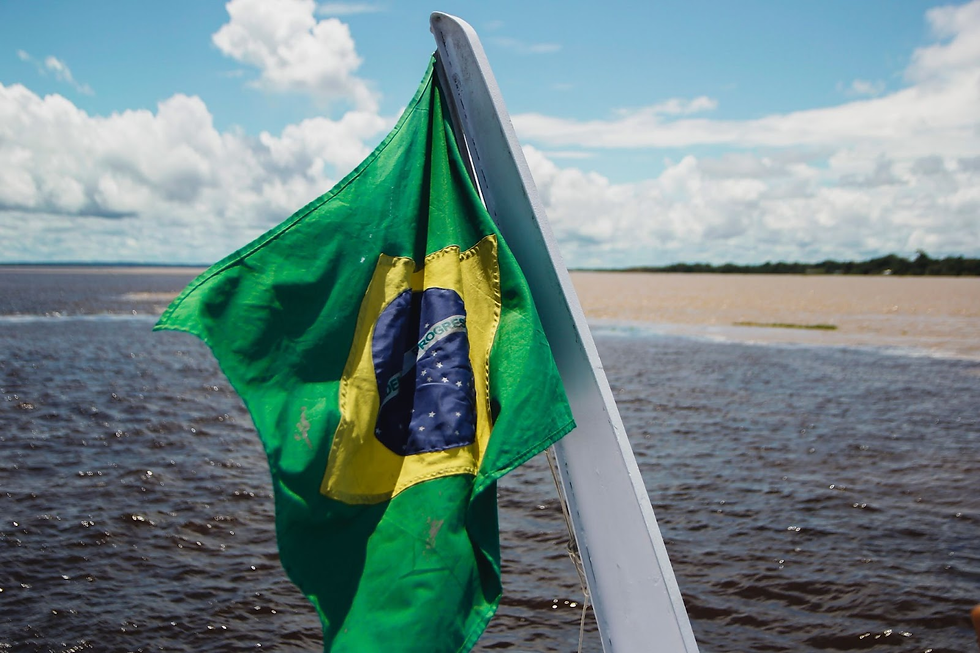The victory of Luiz Inácio Lula da Silva, commonly known simply as Lula, over Jair Bolsonaro in Brazil’s presidential election last October was met with a mixture of elation and relief by environmentalists and indigenous activists across the world. But can he do what many see as impossible: save the Amazon rainforest from destruction?

Pro-Lula flags ahead of the 2022 Brazilian Presidential Election. Image credit: Tutz Dias
Lula’s predecessor, Jair Bolsonaro, was a far-right, populist, stridently pro-business president who wantonly and sometimes gleefully dismantled Brazil’s environmental protections and revelled in encouraging development in the country’s rainforest. Destruction of the Amazon rainforest, primarily by logging, ranching and mining, increased by 88% during Bolsonaro’s first month in office alone. When this statistic was released he dismissed the data as fake and sacked the head of the agency that produced it. He crippled efforts to reduce logging, ranching and mining in the Amazon by cutting funding and watering down punishments for illegal deforestation. Needless to say, he was an object of hatred and contempt among environmentalists, ecologists, and most notably indigenous activists. In the process of encouraging the destruction of the rainforest, he stripped away protections for indigenous peoples living in the Amazon to enable further development.
By contrast, Lula was worshipped as a hero by environmentalists. An ardent left-wing socialist and trade unionist, he had previously been Brazil’s president between 2003 and 2010, and took pride in his green credentials, running on a platform of protecting the Amazon and the indigenous groups who call it home. He created conservation areas and indigenous reserves that led directly to a dramatic reduction in deforestation during his first presidency. The graph below clearly demonstrates how deforestation rates dropped dramatically during Lula’s first presidency, from a staggeringly high level, then remained relatively low until Bolsonaro’s tenure, at which point rates increased once again.

Image credit: RCraig09
His inauguration as president on New Years’ Day 2023 was greeted with both relief and anticipation by activists, anxious that this backward slide not only be halted but reversed, and entranced by bold promises from Lula of decisive action. He declared that he “will do whatever it takes to have zero deforestation and degradations of our biomes”. He has pledged to revive the international ‘Amazon Fund’ which had provided billions of dollars in funding for anti-deforestation efforts before being shut down under Bolsonaro, and to take forceful action to halt illegal logging and mining in the Amazon. The appointment of the acclaimed environmental activist and politician Marina Silva as Environment Minister has also been hailed as an encouraging sign, demonstrating the depth of Lula’s commitment to carrying out his promises. Silva has become an icon of the green movement, being named a ‘Champion of the Earth’ by the UN in 2007 for her high-profile and forceful efforts to save the rainforest from destruction. But, for all of Lula’s combative rhetoric and substantive policy proposals, is it realistic or even possible for the president to save the Amazon from what appears to be its imminent destruction?

A pro-Bolsonaro rally in Belo Horizonte, 2021. Image credit: Matheus Câmara da Silva
Lula can undoubtedly reverse the backsliding that has occurred under Bolsonaro. He can clamp down on the illegal logging and mining that Bolsonaro largely turned a blind eye to, by sending in federal forces to disrupt their operations and ramping up punishments such as fines and imprisonment for those caught. Although it’s virtually impossible to eliminate illegal deforestation entirely – the Amazon is incredibly vast and government resources are not limitless – the practice could plausibly be drastically reduced through firm and decisive action. Restoring and strengthening protections for indigenous peoples will also ensure the short-term survival of significant swathes of the rainforest that had been under threat during Bolsonaro’s tenure, as around 13% of Brazil is recognised as indigenous territory and therefore protected from some forms of development and exploitation. Bolsonaro was notorious for his horrific attitudes towards indigenous peoples, including openly lamenting that “it’s a shame that the Brazilian cavalry hasn’t been as efficient as the Americans, who exterminated the Indians [his archaic term for indigenous peoples]”, and arguing that “the Indians are evolving, more and more they are human being like us”. His belligerent approach towards indigenous groups threatened the safety of vast expanses of the rainforest that have enjoyed protection from destruction for decades, and his defeat to Lula heralds a step-change in government policy towards indigenous groups and their land, promising to preserve their territory for the foreseeable future.


Comments